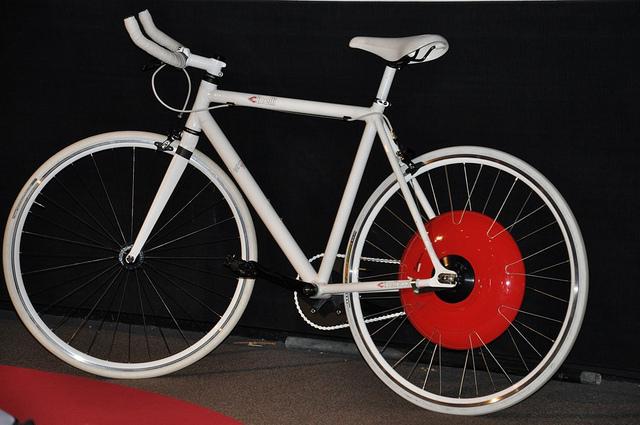Attendees at the advanced city of Amsterdam are in for a treat with the widely celebrated Copenhagen Wheel. A device that transforms your bicycle into a smart electric hybrid, quickly and easily. The design, complete with all the essential hardware, has been made efficiently to fit into a conventional bicycle fork.
Containing a motor, batteries, multiple sensors, wireless connectivity, and an embedded control system, the Copenhagen Wheel learns how you pedal and integrates seamlessly with your motion, multiplying your pedal power 3x—10x.
Copenhagen Wheel to potentially reinvent the bicycle
Users of the Copenhagen Wheel are able to connect their smart phone to the device in order to record stats including distance and energy output.
Flat-shaped motor designs of electric hybrid bicycle, also known as pancake motors, have been used in the past however, it is obvious that overall performance left much to be desired.
The latest development sees the Copenhagen Wheel using the DC brushless motors’ precision control, which had been built to near perfection.
From a technical point of view, many might argue that many of Copenhagen Wheel’s current specifications are not very impressive.
Futuristic bicycle tech promises more to come for consumers
However, it does boast of a number of valuable features. One of the Copenhagen Wheel’s noteworthy characteristics is its soon-to-come SDK that will give the device more options for customization.
Further applications of the Copenhagen Wheel include the typical wheelchair design which could become much more interesting as developers believe this side by side use is even more effective than the bicycle tandem design.
Likewise, more tweaks can be made handy to manually-powered flight designs, if a re-geared hub is spun around 90 degrees while sticking a small-sized prop at the end.
Coppenhagen Wheel alternative applications to expand potential market
These designs, with the Copenhagen Wheel in use, might actually benefit from such enhancement.
Those who are not completely sold on the idea of adopting this type of device validates their disapproval of the project with a legal approach, rather than a technical one.
Current applicable laws have their interpretation of which type of power is worthy of licensing. With price pegged at below $1000, many who are eager to make use of the Copenhagen Wheel will hopefully be able to discover for themselves in the near future what the device is capable of.
Photo courtesy of GriinBlog on Flickr



